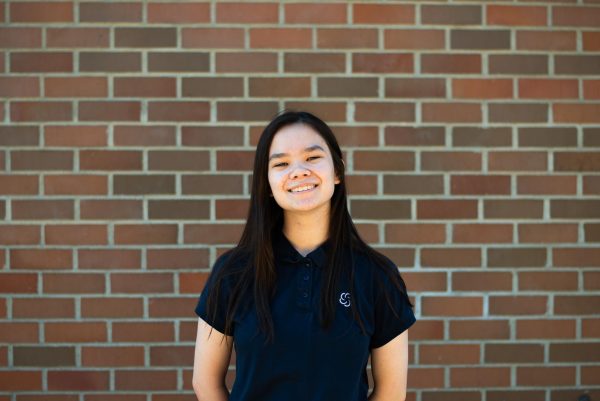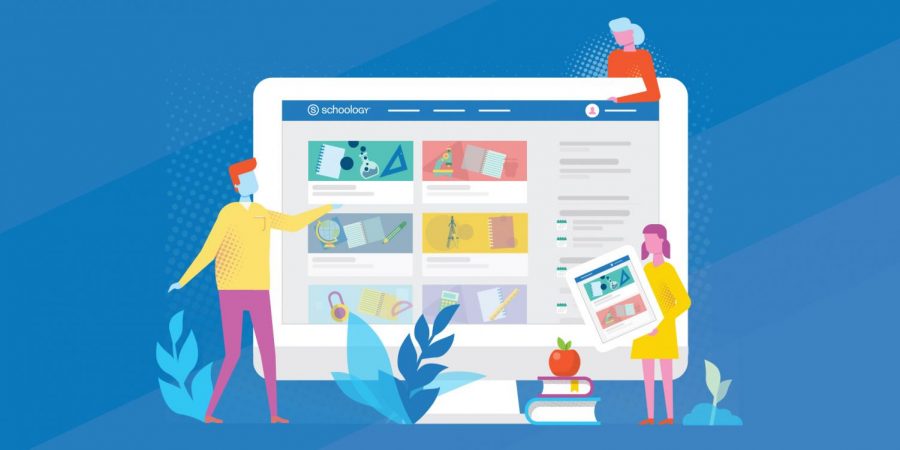Schoology and academic transparency: Where do we draw the line?
Schoology’s parent access codes threaten the wellbeing and success of students.
With the ongoing digitization of school syllabi, assignments and grades, a conscientious student need only click “Grade Report” for a breakdown of how they are doing in a given course down to the last percentage point. Platforms like Schoology are specifically designed to make this as clear and accessible as possible.
What if your parents had access to all this information, too? That each assignment and assessment would be available to your parents as soon as they were to you?
Though not the case for Castilleja students, that is the reality for many of those who attend schools that distribute Schoology’s parent access codes, which give a guardian full access to their child’s Schoology activity and grades. But that system is counterproductive—in fact, it promotes miscommunication and prevents students from learning to balance their own responsibilities.
In the high-pressure, high-achievement bubble of Silicon Valley, it may seem natural to some that parents should be able to view their child’s grades: isn’t it a parent’s job to ensure their child is academically successful? How would they be able to do that if they don’t have access to Schoology?
Nominally, that sentiment is one I agree with. However, Schoology does not provide a limit to what parents can and cannot see. Every quiz, test and assignment you turn in (or don’t) is there for your parents’ eyes—significantly more scrutiny than is normally afforded by semesterly report cards. It means that a parent could see and text their child about a score they got on their math test before that student has even gotten the chance to see it. Your parents aren’t in the classroom themselves. They don’t know how hard that test was, or if you’ve scheduled a retake with your teacher already, or if your teacher mis-entered the score into Schoology and made it look like you are failing a class when you’re actually doing just fine. When parents can see the result, but lack context, it fosters misunderstanding and creates undue stress for both the student and the guardian.
Furthermore, this unilateral distribution of access codes to parents means that students get less experience holding themselves accountable because parents are going to keep track of their children’s responsibilities on their behalf. It’s not even that all parents are suffocating or helicopter parents—far from it. But Castilleja students are infamous for struggling to rein themselves in when it comes to checking grades; how is a concerned parent going to be better at that than their own children? It is especially vital for high schoolers to practice being responsible for their own lives. After all, post-high school, they won’t have parents checking over their shoulder and reminding them about missed assignments or dubious grades. It’s important to get an early start at practicing these lifelong skills; by keeping the temptation to helicopter in check, parents are doing their kids a favor.
For those students whose parents are more domineering, some of this may be difficult to swallow. What does taking Schoology away from parents do? Wouldn’t involved parents just interrogate their children about grades through different means than Schoology? To which I say: good point. Unfortunately, one change in the system cannot reduce parental pressure for all students. What it can do, however, is benefit the students whose parents ordinarily keep a reasonable balance between allowing their child to manage their own academic life and recognizing when they need to step in themselves. It’s difficult for parents to embrace the ambiguity of not knowing how their child is doing academically when there is such a tempting portal to answering those questions. The extra layer of insulation between a student and parent’s responsibilities that is restricting parental access to Schoology can be just the step a parent needs to maintain a healthier distance between their child’s responsibilities and their own.
Some parents may also be disquieted at the implication that their child’s academic life would be completely opaque to them. But there are a multitude of ways that parents are kept in the loop about academics. Using Castilleja as an example, it is school policy to alert parents if a student is receiving an average course grade of a C+ or less, or receives an unusually poor score on an assessment, or seems to be less motivated in class… and so on and so forth. And if all else fails, one could always resort to, well… having a conversation with their child. As difficult as it may seem to do so, making consistent efforts at communication is never a bad thing.
Well, you may be wondering, so what? Castilleja doesn’t allow parents to view their children’s Schoology activity. Is this relevant to our lives, then? Of course. Not a brisk walk away from Castilleja, you reach Paly, which is part of the Palo Alto Unified School District (or PAUSD) and automatically creates guardian accounts for incoming members to the system, according to the PAUSD’s Schoology FAQ. Anecdotally, there are a vast number of schools that, having recently implemented Schoology, distribute parental access codes to all guardians without consulting students. My hope is that, having examined this topic in detail, all schools that make use of Schoology may follow Castilleja’s lead and reconsider their policy on parental access to student accounts. After all—it would benefit all of us.

Michelle Leonard '24 is Counterpoint's Editor of News. She is active in the arts, co-leading Glee and performing in Castilleja’s theater productions....



Michelle | Nov 15, 2021 at 11:25 am
I agree a lot with this, and I love how detailed you made your article.